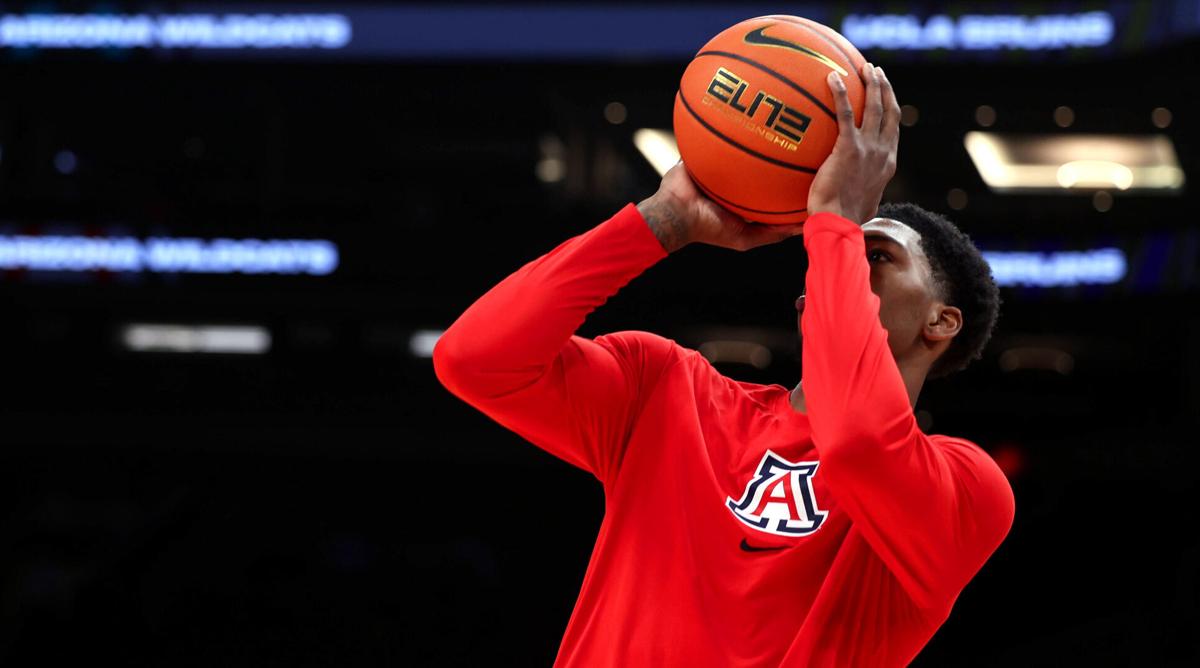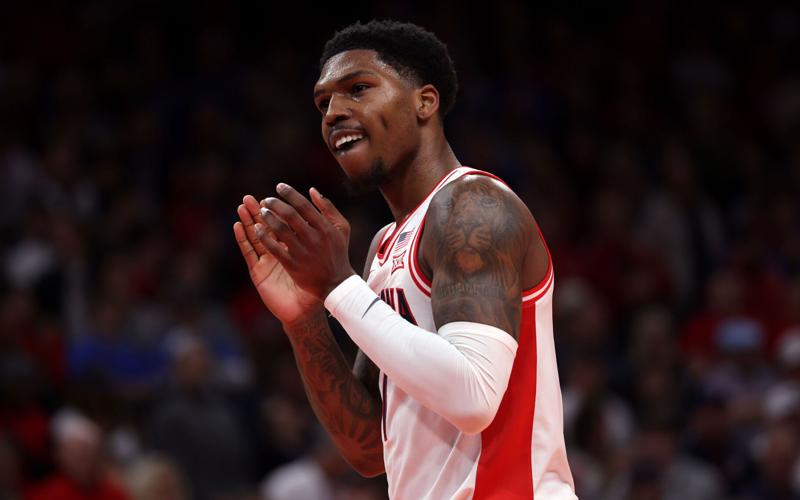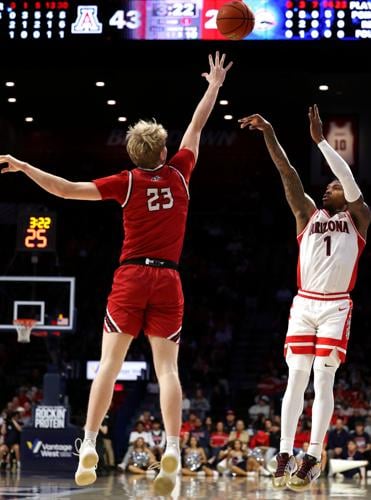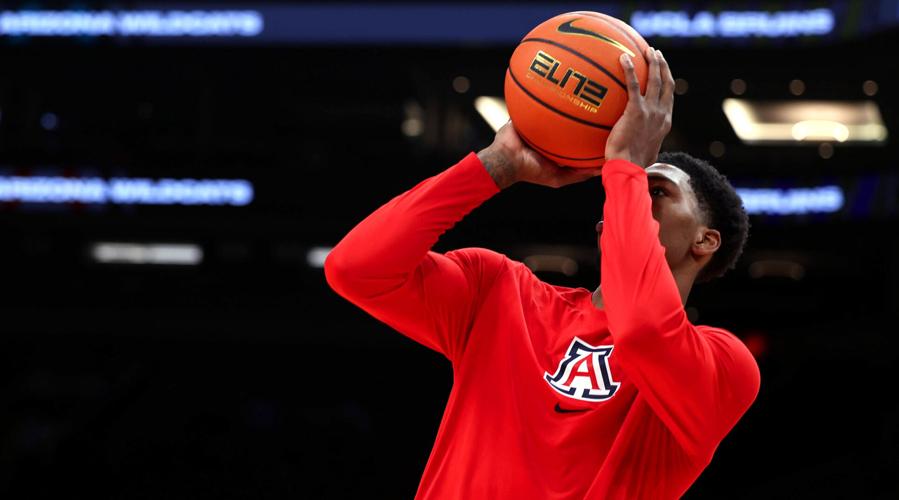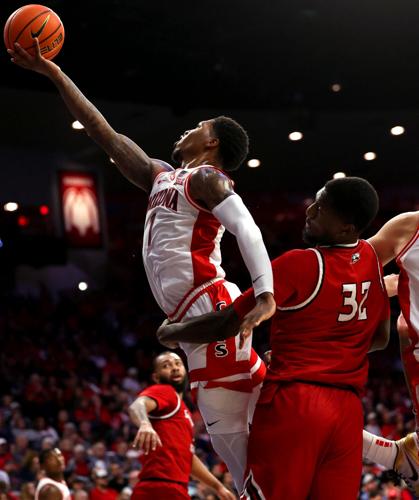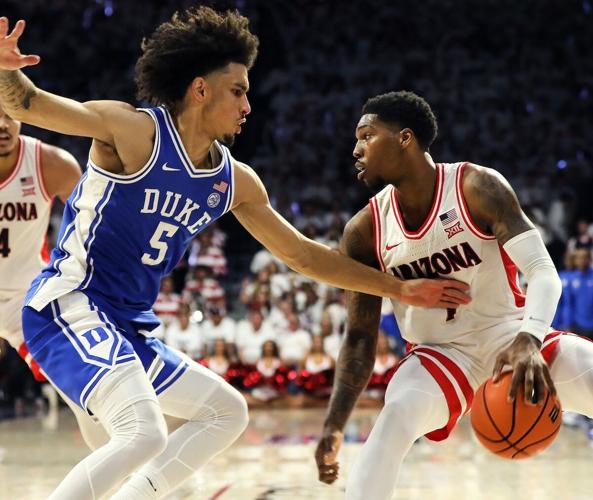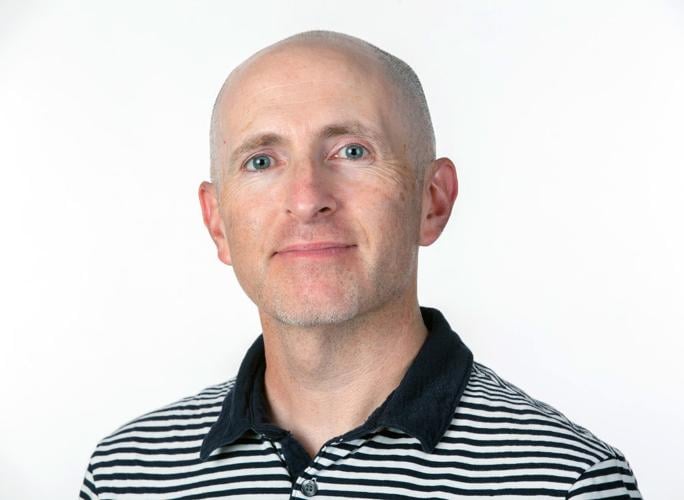The last thing I ever want to do in this space is disparage a student-athlete.
One could argue that everyone is fair game now, at least in the so-called “revenue” sports, because they’re essentially professionals. Players have received NIL compensation since 2021, and they’re about to receive money directly from their schools via revenue-sharing.

Michael Lev is a senior writer/columnist for the Arizona Daily Star, Tucson.com and The Wildcaster.
But it still feels wrong to attack 18- to 23-year-olds, no matter the sticker price of their cars or the square footage of their apartments. So we aren’t going to do that today in regard to enigmatic Arizona men’s basketball guard Caleb Love, who unwittingly has become the personification of the Wildcats’ sluggish start.
Instead, we’re going to explore answers to a perplexing question: What the heck is going on with the UA’s preseason first-team All-American?
People are also reading…
Love hasn’t been the same since Arizona clinched the 2023-24 Pac-12 regular-season championship at UCLA on March 7. Nor have the Wildcats. That probably isn’t a coincidence.

Arizona guard Caleb Love celebrates after the Wildcats catch up to the UCLA Bruins during their game at Footprint Center in Phoenix on Dec. 14, 2024. Love would finish with seven points on 3-of-10 shooting.
At the end of that game — in which Love scored 17 points on 5-of-10 shooting — the transfer from North Carolina had career-best numbers in just about every meaningful category. He was averaging 19.3 points per game while shooting 43.7% from the field and 36.1% from beyond the 3-point arc. Under Tommy Lloyd’s tutelage, Love had made himself a better player.
He then fell into a horrific slump from which he has yet to extricate himself.
In the 15 games since that clincher at Pauley Pavilion, Love has averaged 12.6 points while shooting 33.3% from the floor and 24.6% from 3.
It’s an inexplicable, possibly unprecedented drop-off by a player who should be at his peak.
It’s not as if Love turned 39 years old on March 8 and lost his hops. He didn’t suffer a debilitating injury celebrating the Pac-12 title. If something is going on in Love’s personal life, he hasn’t told the media about it.
So how do we explain this Love disconnection between the player he was for the first 30 games of his UA career and the one he’s been since?

Arizona guard Caleb Love takes practice shots before the game against the UCLA Bruins at Footprint Center in Phoenix on Dec. 14, 2024.
The most logical place to start is another area we’re loathe to go. But it cannot be ignored or overlooked.
Love appears to be in the midst of a crisis of confidence. He’s in his own head.
These crises strike even elite athletes. Ask any professional golfer or tennis player what the difference is between winning and losing — between being the 100th-ranked player or the 10th. They’ll tell you it’s mostly mental. There’s a reason sports psychology is a recognized field of medicine.
How could this happen to a veteran like Love, who’s seen and done it all in college basketball? It could happen to anyone. When you’re expected to be The Guy — and the ball isn’t going through the hoop — you’re especially vulnerable.
Love undoubtedly feels more pressure this season on a team that doesn’t have as many veterans who’ve been there and done that. Oumar Ballo is at Indiana. Pelle Larsson and Keshad Johnson are in the NBA.

Arizona guard Caleb Love, right, shoots the ball over Southern Utah guard Duncan Reid during the second half of their game at McKale Center on Dec. 7, 2024.
Transfer Trey Townsend was supposed to fill that void, but he has struggled to find his niche in a new situation. Townsend and Love are the only seniors (both fifth-years) who play regularly.
Even the much-maligned Kylan Boswell, who’s now at Illinois, provided something last season that this team lacks: the threat of making a 3-point shot. Which brings us to the next phase of exploration: basketball reasons.
Arizona ranks last in the Big 12 in 3-pointers made per game and 3-point shooting percentage. Love has made the most and attempted the most, and his 27.9% success rate has suppressed the team’s percentage. But he doesn’t have much in the way of help.
Transfer Anthony Dell’Orso is by far the Wildcats’ best perimeter shooter, knocking down 1.8 3-pointers per game at a 51.6% clip. But Lloyd has put a cap on his minutes because of deficiencies on defense. Dell’Orso and Townsend have the worst defensive ratings (estimated points allowed per 100 possessions) among UA regulars, per Sports-Reference.com.

Arizona guard Caleb Love (1) attempts to charge through Thunderbirds center Malik Lamin (32) during the game against Southern Utah at McKale Center on Dec. 7, 2024.
Jaden Bradley — who’s been Arizona’s best player — and KJ Lewis haven’t developed into consistent outside threats. Freshman Carter Bryant has a pretty stroke but isn’t there yet, either.
Because of all that, opponents know they can defend the Wildcats in a certain way. They can play off everyone except Love, leaving him with fewer open shots and less room to operate should he pursue Plan B — driving to the basket.
When all else failed last season, Love at least could get to the line and knock down foul shots. He isn’t getting there this year, averaging a scant 1.3 free throw attempts per game — down from 4.0 a year ago.
Love has the ability to get into the lane and draw fouls. He’s quick, fast, springy and strong enough to absorb contact and make a shot. But doing so requires conviction, and Love doesn’t have that right now.
You can tell from his body language. (“Body Langue Doctor” is not a recognized medical profession, although you wouldn’t know it if you spent five minutes on social media during a game.) Some perceive Love’s slumped shoulders as indifference. That’s not what I’m hearing from people close to the team. Love cares.

Arizona guard Caleb Love, right, is defended by Duke guard Tyrese Proctor in the second half during a game at McKale Center on Nov. 22, 2024.
Love told Star colleague Bruce Pascoe before the season that he spent “the whole summer” in Tucson and “was in the lab pretty much every day, twice a day, sometimes three times a day.” He also spent “considerable time sitting down to watch video,” per Pascoe.
Maybe Love overdid it. Maybe this is a paralysis-by-analysis situation. He could be thinking too much while on the court instead of just playing. But altering that approach is easier said than done.
The Body Language Doctors, who are as frustrated and discouraged as Love, have called for him to be benched. It’s a valid request. This is a performance-based industry after all.
Unlike, say, quarterbacks in football, you can be “benched” in basketball and still contribute to the team. Lewis has come off the pine the past three games yet played “starter’s minutes.”
Could that be a way to spark and motivate Love? Or would it just do further damage to his already fragile psyche?
It’s a difficult decision amid a vexing conundrum — a Love story that’s taken an unexpectedly sour turn.
Contact sports reporter/columnist Michael Lev at mlev@tucson.com. On X (Twitter): @michaeljlev. On Bluesky: @michaeljlev.bsky.social



